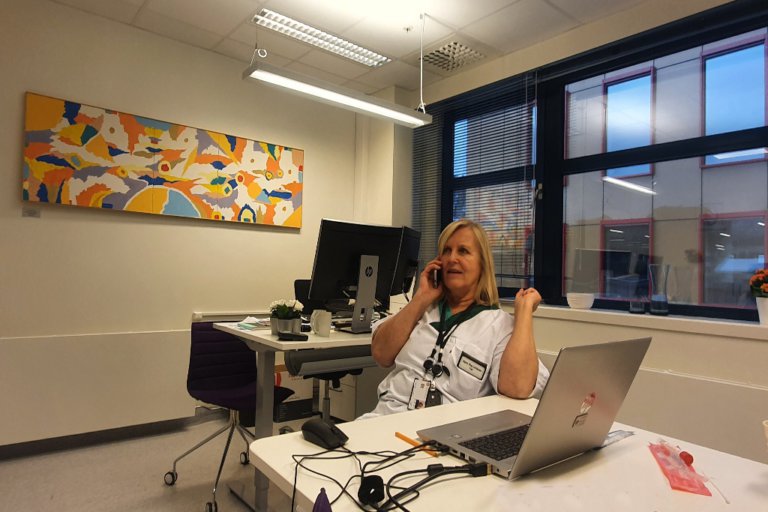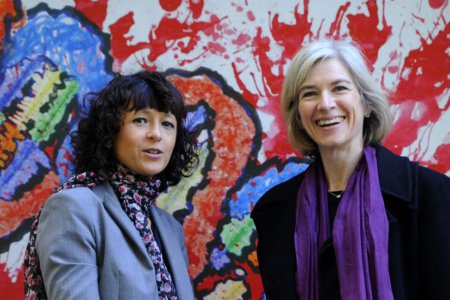
In a world where a woman’s career choices are often dictated by what society thinks she’s capable of, some women wrested back the power to shape their professional destinies.
Dagrun Waag Linchausen and Martina Butz are two of them. They challenged the notion that certain careers are reserved for specific age groups or genders.
Their stories offer a glimpse into the courage required to embrace change and the fulfilment you stand to gain when you choose to change careers.

Oprah Winfrey made the career switch from news anchor to TV show host of “The Oprah Winfrey Show.” Source: AFP
Dagrun Waag Linchausen: Studying medicine at 49 years old
Dagrun Waag Linchausen from Norway pursued not one but two careers.
She originally studied civil economics at NHH Norwegian School of Economics before making the bold decision to change careers.
At the age of 49, after a successful 25-year stint in various industries, including marketing and management, Linchausen decided to join the world of medicine, eventually becoming the emergency department chief at a hospital.
Her journey began when she hit a professional wall in the business world. A moment of reckoning occurred during a mountainous consulting assignment, forcing her to reassess her priorities.
Describing the turning point in her life, Linchausen recalls, “I had to swerve my car into the ditch before driving into the next tunnel. I couldn’t keep the car on the road. I hit the metaphorical wall.”
As she describes it, “I ended up on sick leave. I literally retreated into the basement, having decided I was staying there until I figured out my next move.”
This period led her to revisit a childhood dream of studying medicine. The decision to change careers was liberating, as she found her passion and a renewed sense of purpose.

Did you know women make up more than one-third of all physicians in the US and are the growing majority among medical students? Source: AFP
Facing scepticism and age-related doubts, Linchausen remained undeterred. Her grandmother’s wisdom, “there’s rest in changing work,” echoed in her mind, providing motivation.
Despite the challenges, she treated medical school like a job, diligently putting in hours. After completing her studies and internship, she started her own general practice.
Eventually, she became a general medicine specialist, allowing her to meet many patients and use a wide range of expertise in both the medical and human aspects.
Her unique blend of business acumen and medical expertise later came together as she became the chief of emergency medical services.
“I had to use all the skills and experiences I had gained over the years — my studies in business administration, my time in the business world, my experience as a consultant, my medical education, and my experience as a doctor,” she says.
“It all came together. I strongly desired to make the emergency medical services an important institution in Bergen.”
This knowledge and skills played a pivotal role during the COVID-19 pandemic.
“We had to organise new tasks and find solutions that didn’t exist before. It required a lot of networking, collaboration and strategic thinking,” Linchausen shares.
Today, she is retired but remains active in her professional life. She holds board positions in the healthcare field, combining economics and medicine and continues to take shifts at the emergency medical services and work as a substitute senior doctor when needed.
During the past year, Linchausen took on a job as a lecturer at the University of Bergen, teaching emergency medicine. Her advice to those contemplating a career change is simple yet powerful: “Just go for it!”
She emphasises the regret often accompanying missed opportunities and encourages others not to hesitate.

Martina Butz made the switch from law to public utilities and is now CEO of the public utility of the City of Hanau. Source: Martina Butz
Martina Butz: Transitioning from law to economic leadership
Similar to Linchausen, Martina Butz made the decision to change careers as well.
Butz is a German professional who defied the conventional path of a legal career to become the CEO of the public utility for the City of Hanau.
She initially pursued law at Goethe University in Frankfurt, driven by a desire to work as a lawyer in Germany.
However, after years of practising law and completing her Master of Laws at the Frankfurt School of Finance & Management, she realised that her passion extended beyond the legal field.
She reflects, “I knew deep down that ‘only’ being a lawyer is not what I would want to do in the long term.”

Most working women face the challenge of balancing being a mom and fulfilling parenting obligations while also fulfilling work obligations. Source: AFP
Butz’s early exposure to the business world through her father, an owner of an electrical engineering company, influenced her to consider pivoting into economics.
Through a Master of Laws programme, she honed a unique blend of legal expertise and entrepreneurial insights, providing a bridge from a purely legal standpoint to an economic and business-oriented perspective.
Butz shares, “Knowing the best of both worlds was and still is a major benefit.”
This fusion of legal and economic perspectives empowers her decision-making as a CEO, allowing her to evaluate matters beyond mere legal considerations.
As a woman, mother, and sole managing director,Butz faced the initial challenge of balancing motherhood with her role as a businesswoman.
Her experience highlights the need for resilience and assertiveness in a leadership position. She emphasises, “You can’t be weak. You always need to be friendly but also direct and straightforward.”
Butz’s advice for aspiring managers is simple yet powerful: “Go and try! If you rejoice in something, you will be a good manager.”

While some women may choose to prioritise their careers over starting a family, others may balance both career and family life. Source: AFP
Why is it difficult for women to change careers?
But the question remains, “Why is it so difficult for women to change careers?”
Choosing to change careers is a journey with numerous challenges, and for many women, this decision can be particularly difficult, especially when family and children are part of the equation.
Many women delay career changes until later in life. Around 30% of women in the US change careers in their 30s, and this percentage increases to nearly 50% for women in their 40s.
For women with families, deciding to change careers is a balancing act. The fear of financial instability and the uncertainty of how the change will impact the family can be daunting.
Many women may put off this decision until their children are older or more independent, believing that time plays a crucial role in the success of their career change.
For various reasons, many women hesitate to pursue high-paying jobs that demand significant time and effort.
One main factor is the persisting gender wage gap, where women earn, on average, 82 cents for every dollar earned by their male counterparts.
This economic disparity creates a disincentive for women to invest in careers that demand extensive commitment, as the financial return may not align with the effort exerted.
According to a survey by LeanIn.Org and McKinsey, women are also more likely than men to cite family responsibilities as a barrier to career advancement, with 24% of women expressing concerns about balancing work and family compared to 11% of men.










